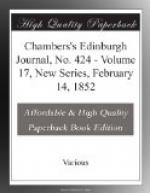Title: Chambers’s Edinburgh Journal, No. 424, New Series, February 14, 1852
Author: Various
Editor: Robert Chambers and William Chambers
Release Date: April 5, 2005 [EBook #15549]
Language: English
Character set encoding: ASCII
*** Start of this project gutenberg EBOOK Edinburgh journal ***
Produced by Malcolm Farmer, Richard J. Shiffer and
the PG
Online Distributed Proofreading Team.
Chambers’Edinburgh journal
Conducted by William
and Robert Chambers, editors of
’Chambers’s
information for the people,’
‘Chambers’s educational course,’
&c.
No. 424. New series. Saturday, February 14, 1852. Price 1-1/2 d.
THE PATTERN NATION.
It seems to be the destiny of France to work out all sorts of problems in state and social policy. It may be said to volunteer experiments in government for the benefit of mankind. All kinds of forms it tries, one after the other: each, in turn, is supposed to be the right thing; and when found to be wrong, an effort, fair or unfair, is made to try something else. It would surely be the height of ingratitude not to thank our versatile neighbour for this apparently endless series of experiments.
Unfortunately, the novel projects extemporised by the French are not on all occasions easily laid aside. What they have laid hold on, they cannot get rid of. We have a striking instance of this in the practice of subdividing lands. Forms of state administration may be altered, and after all not much harm done; it is only changing one variety of power at the Tuileries for another. A very different thing is a revolution in the method of holding landed property. Few things are more dangerous than to meddle with laws of inheritance: if care be not taken, the whole fabric of society may be overthrown. The unpleasant predicament which the French have got into on this account is most alarming—far more terrible than the wildest of their revolutions. How they are to get out of it, no man can tell.
Latterly, the world has heard much of Socialism. This is the term applied to certain new and untried schemes of social organisation, by which, among other things, it is proposed to supersede the ordinary rights of property and laws of inheritance—the latter, as is observed, having, after due experience, failed to realise that happiness of condition which was anticipated sixty years ago at their institution. As it is always instructive to look back on the first departure from rectitude, let us say a few words as to how the French fell into their present unhappy position.




